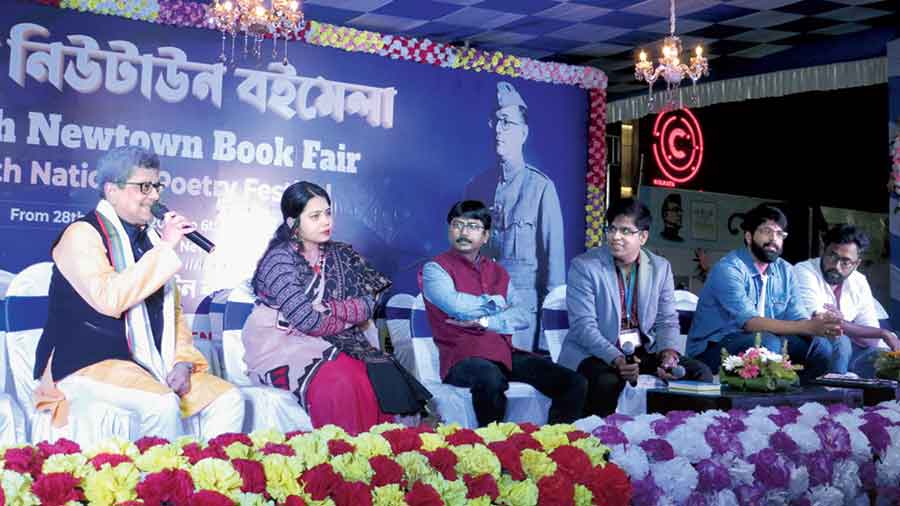The necessity of social media to achieve success as an author was the subject for a discussion, moderated by Pijush Ranjan Ghosh, at the New Town Book Fair on the opening day.
Author Arpita Sarkar, who started out as a writer on her Facebook page Ek Chilte Roddur, initiated the exchange by citing the biggest advantage of social media — instant reaction. “If you write in a magazine, readers will not come to your doorstep to tell you if they liked your work. But you got to be able to take criticism along with praise,” she said.
Publisher Maruf Hossain insisted that the quality of writing had to be good to make a mark even on social media, a view seconded by radio jockey Sujoyneel, who is a regular writer on Facebook. “I started lockdown with 25,000 followers. In those months, I became more active and my following spiralled to 1.5million. But to survive I got to maintain quality,” Sujoyneel said.
The quality of appreciation on social media also came up for analysis. “We saw the Kancha Badam song going viral. But a song being shared and getting likes is not enough to rate it as a success. It counts only when qualified people praise a song or a piece of writing,” said author Aveek Ray, who added that to him comments counted more than likes, which are more like “marks of solidarity”. “When you get thousands of likes within a minute of posting an article, how many could have actually finished reading it before reacting?” he wondered.
Publisher Tridib Chatterjee, who writes on Facebook, pointed out that lack of filter was a drawback of social media. Sujoyneel wondered if blocking critics was the right approach towards filtration. Aveek shared an anecdote about sharing a poem by Jibanananda Das on social media without naming the poet. “Someone criticised the rhythm of the poem,” he laughed, underlining the point that trolls have no respect for either age or stature.
Arpita admitted to being affected by negative comments. “I had once said that we needed to build a reader base before we came out as published authors. Otherwise why would anyone buy my books rather than those of Sunil Ganguly or Suchitra Bhattacharya?” This comment, she rued, was misconstrued to mean that she was equating herself with such luminaries.
Readers getting used to easy and free access to original writing could also be a problem when an author starts publishing his or her works in print. “Now that I am contributing to magazines and books, I have reduced posts on Facebook. People ask when I would post. But how much can I write across media without compromising quality?” she wondered.
Posting original work on social media also carried the risk of plagiarism, Arpita pointed out. “It’s just a matter of copying and pasting without giving credit.”
Chatterjee credited Facebook for helping publishers like him find new authors. “I found someone writing very well on Facebook who stays about 12km away from the nearest rail station! Earlier we had to scout for such talent.”
But Sujoyneel criticised the tendency of some publishers to pick authors based on the size of their social media following. “How much are they serving literature by printing sub-standard writing just in the hope of sales driven by social media followers?” he argued. Arpita felt that for such authors even if the first book did well, the second would fail for lack of quality.
Hossain conceded that most publishers still had not learnt to harness the power of digital publicity. “Chetan Bhagat’s writings may not rank high in literary value but he is an astute writer. He brings out a trailer for his new titles which gets him 2 lakh prebookings.”
